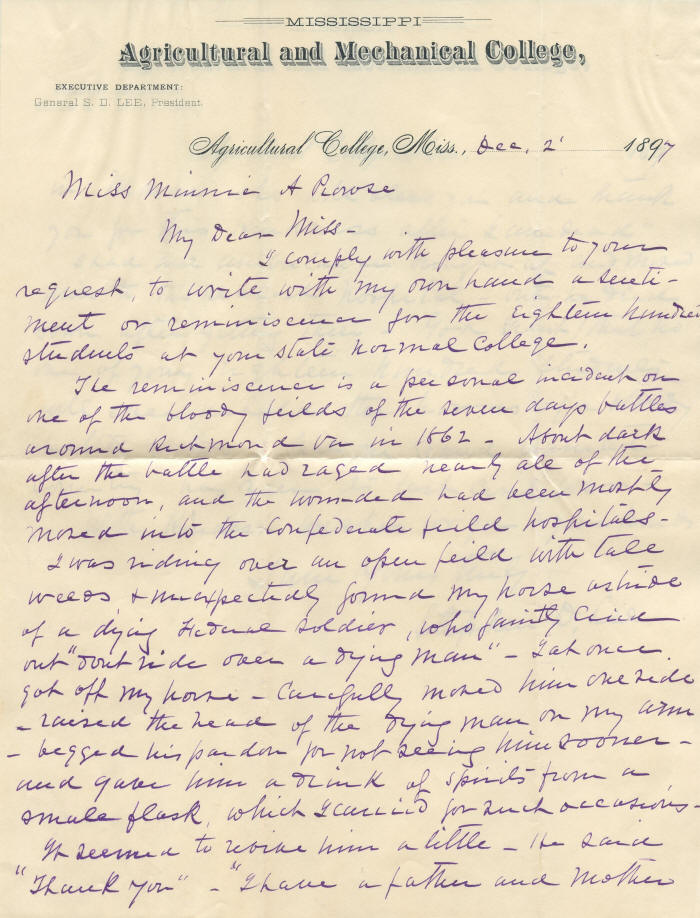

1007394
Stephen D. Lee
“God grant! that no one of your . . . students will ever behold
the horrors of a bloody battle field—
That our grand reunited country has seen its last civil war.”
Stephen Dill Lee, 1833–1908. Confederate Lieutenant General. Superb Autograph Letter Signed, Stephen D. Lee, two pages, 8⅜” x 10⅞”, on stationery of the Executive Department, Mississippi Agricultural and Mechanical College, Agricultural College, Mississippi, December 2, 1897.
This magnificent letter recounts poignant Civil War history—the history of a soldier’s death on the battlefield—as Lee himself experienced it. Lee, then president of the Mississippi college, responds to the request of a penmanship student at the State Normal School at Emporia, Kansas, now Emporia State University, for a holograph sentiment or reminiscence to be included in albums devoted to the handwriting of prominent people.
Lee recalls the horror of war: Nearly riding his horse over a wounded Union soldier lying in the weeds one evening after a long afternoon of fighting during the the Seven Days’ Battles around Richmond, Virginia, in 1862, Lee tried to save the dying soldier but was unable to do so. Recalling the soldierʼs death and the horror of war, he writes:
I comply with pleasure to your request to write with my own hand a sentiment or reminiscence for the eighteen hundred students at your state normal college.
The reminiscence is a personal incident on one of the bloody fields of the seven days battles around Richmond Va in 1862. About dark after the battle had raged nearly all of the afternoon, and the wounded had been mostly moved into the Confederate field hospitals – I was riding over an open field with tall weeds & unexpectedly found my horse astride of a dying Federal soldier, who faintly cried out, “don’t ride over a dying man” – I at once got off my horse – carefully moved him one side – raised the head of the dying man on my arm – begged his pardon for not seeing him sooner – and gave him a drink of spirits from a small flask, which I carried for such occasions – It seemed to revive him a little. He said “Thank You” – “I have a father and mother in Maine, who will bless you and thank you for this kindness after I am dead”
I had an ambulance brought up and moved him to the nearest hospital – but he died soon after getting there – God grant! that no one of your eighteen hundred students will ever behold the horrors of a bloody battle field – That our grand reunited country has seen its last civil war.
At age 32, Lee became the Confederacyʼs youngest lieutenant general, the rank directly below that of General Robert E. Lee, to whom he was not related. Because he was acquainted with all three branches of the army, the infantry, cavalry, and artillery, Stephen D. Lee was one of the Confederacyʼs most able commanders.
Lee, who resigned from the United States Army to join the South Carolina militia, was one of three emissaries whom Confederate Brigadier General Pierre G. T. Beauregard sent to Fort Sumter on April 11, 1861, to demand that Union Major Robert Anderson surrender the fort. Once the war began, he saw action in numerous battles. He participated in the Peninsula Campaign, including the Seven Days Battles mentioned in this letter, and at Second Bull Run and Antietam before becoming chief of artillery under General John C. Pemberton at Vicksburg. He became a Union prisoner of war when Pemberton surrendered to General Ulysses S. Grant, but he was exchanged and saw additional duty at Atlanta and in General John Bell Hoodʼs Tennessee Campaign in late 1864. He surrendered with General Joseph E. Johnston in North Carolina at the warʼs end in 1865.
The Seven Days Battles were a series of six major battles spanning the period from June 21 to July 1, 1862, near Richmond, Virginia. As a result of the battles, the Confederate Army of Northern Virginia, commanded by Robert E. Lee, drove Union General George B. McClellanʼs Army of the Potomac away from Richmond and into retreat down the Virginia peninsula.
Lee has penned this letter in beautiful purple fountain pen. The pages have been tipped together with a spot of glue at each of the upper corners. The letter has vertical and horizontal mailing folds, and the first page has some rippling at the upper left and upper right, probably from the moisture in the glue used to tip the pages together. There are no glue stains, and a conservator likely could separate the pages. Overall the piece is in fine condition.
Unframed.
_____________
This item has been sold, but
click here to see other
American History items
that we are offering.



